An Analysis of Siemens' Sustainability and Corporate Responsibility
VerifiedAdded on 2023/01/11
|10
|2574
|93
Report
AI Summary
This report provides a comprehensive analysis of Siemens' corporate responsibility and sustainability initiatives. It examines Siemens' approach to sustainable development, including its environmental portfolio, which focuses on decarbonization, resource conservation, and product stewardship. The report details Siemens' commitment to carbon neutrality, investments in energy efficiency, and the development of eco-friendly products. It also explores Siemens' social initiatives, such as Healthy@Siemens, which promotes employee well-being, and its commitment to diversity, human rights, and ethical business practices. The report highlights Siemens' alignment with the United Nations' 2030 Agenda for Sustainable Development, emphasizing its efforts to balance people, environment, and profit through sustainable business operations. The paper concludes by underscoring the importance of sustainable development in the context of global resource utilization and presents a case study of Siemens' contributions to environmental and social sustainability.
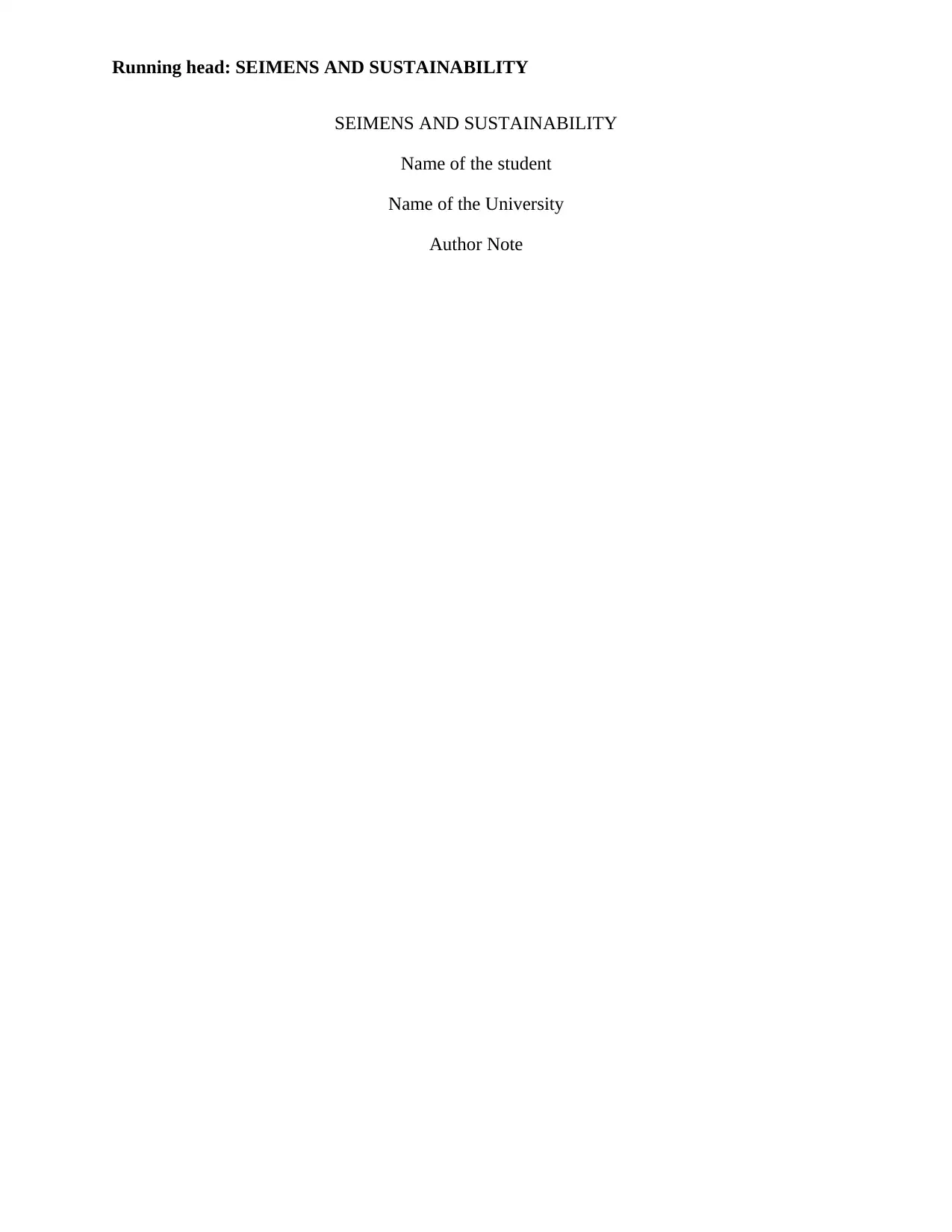
Running head: SEIMENS AND SUSTAINABILITY
SEIMENS AND SUSTAINABILITY
Name of the student
Name of the University
Author Note
SEIMENS AND SUSTAINABILITY
Name of the student
Name of the University
Author Note
Paraphrase This Document
Need a fresh take? Get an instant paraphrase of this document with our AI Paraphraser
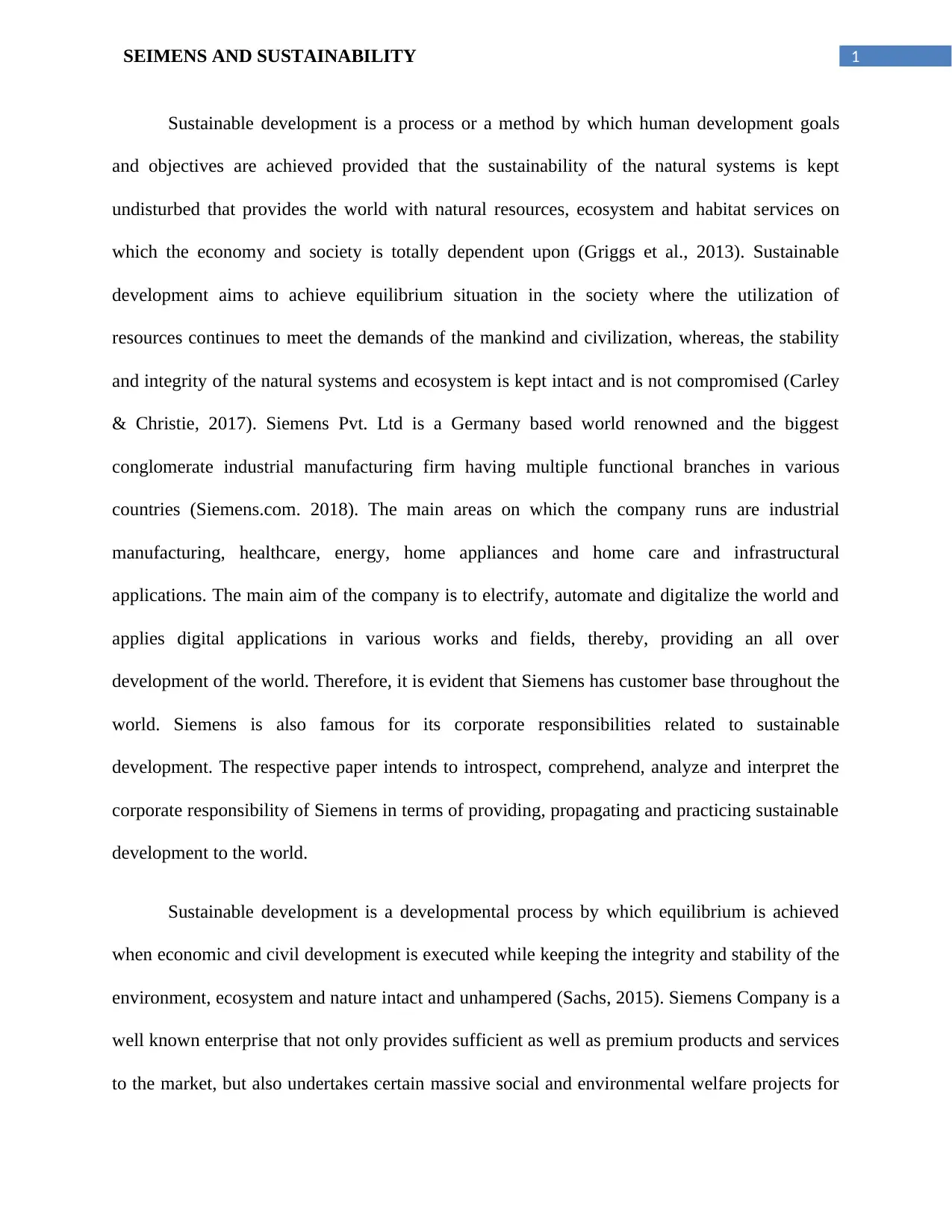
1SEIMENS AND SUSTAINABILITY
Sustainable development is a process or a method by which human development goals
and objectives are achieved provided that the sustainability of the natural systems is kept
undisturbed that provides the world with natural resources, ecosystem and habitat services on
which the economy and society is totally dependent upon (Griggs et al., 2013). Sustainable
development aims to achieve equilibrium situation in the society where the utilization of
resources continues to meet the demands of the mankind and civilization, whereas, the stability
and integrity of the natural systems and ecosystem is kept intact and is not compromised (Carley
& Christie, 2017). Siemens Pvt. Ltd is a Germany based world renowned and the biggest
conglomerate industrial manufacturing firm having multiple functional branches in various
countries (Siemens.com. 2018). The main areas on which the company runs are industrial
manufacturing, healthcare, energy, home appliances and home care and infrastructural
applications. The main aim of the company is to electrify, automate and digitalize the world and
applies digital applications in various works and fields, thereby, providing an all over
development of the world. Therefore, it is evident that Siemens has customer base throughout the
world. Siemens is also famous for its corporate responsibilities related to sustainable
development. The respective paper intends to introspect, comprehend, analyze and interpret the
corporate responsibility of Siemens in terms of providing, propagating and practicing sustainable
development to the world.
Sustainable development is a developmental process by which equilibrium is achieved
when economic and civil development is executed while keeping the integrity and stability of the
environment, ecosystem and nature intact and unhampered (Sachs, 2015). Siemens Company is a
well known enterprise that not only provides sufficient as well as premium products and services
to the market, but also undertakes certain massive social and environmental welfare projects for
Sustainable development is a process or a method by which human development goals
and objectives are achieved provided that the sustainability of the natural systems is kept
undisturbed that provides the world with natural resources, ecosystem and habitat services on
which the economy and society is totally dependent upon (Griggs et al., 2013). Sustainable
development aims to achieve equilibrium situation in the society where the utilization of
resources continues to meet the demands of the mankind and civilization, whereas, the stability
and integrity of the natural systems and ecosystem is kept intact and is not compromised (Carley
& Christie, 2017). Siemens Pvt. Ltd is a Germany based world renowned and the biggest
conglomerate industrial manufacturing firm having multiple functional branches in various
countries (Siemens.com. 2018). The main areas on which the company runs are industrial
manufacturing, healthcare, energy, home appliances and home care and infrastructural
applications. The main aim of the company is to electrify, automate and digitalize the world and
applies digital applications in various works and fields, thereby, providing an all over
development of the world. Therefore, it is evident that Siemens has customer base throughout the
world. Siemens is also famous for its corporate responsibilities related to sustainable
development. The respective paper intends to introspect, comprehend, analyze and interpret the
corporate responsibility of Siemens in terms of providing, propagating and practicing sustainable
development to the world.
Sustainable development is a developmental process by which equilibrium is achieved
when economic and civil development is executed while keeping the integrity and stability of the
environment, ecosystem and nature intact and unhampered (Sachs, 2015). Siemens Company is a
well known enterprise that not only provides sufficient as well as premium products and services
to the market, but also undertakes certain massive social and environmental welfare projects for
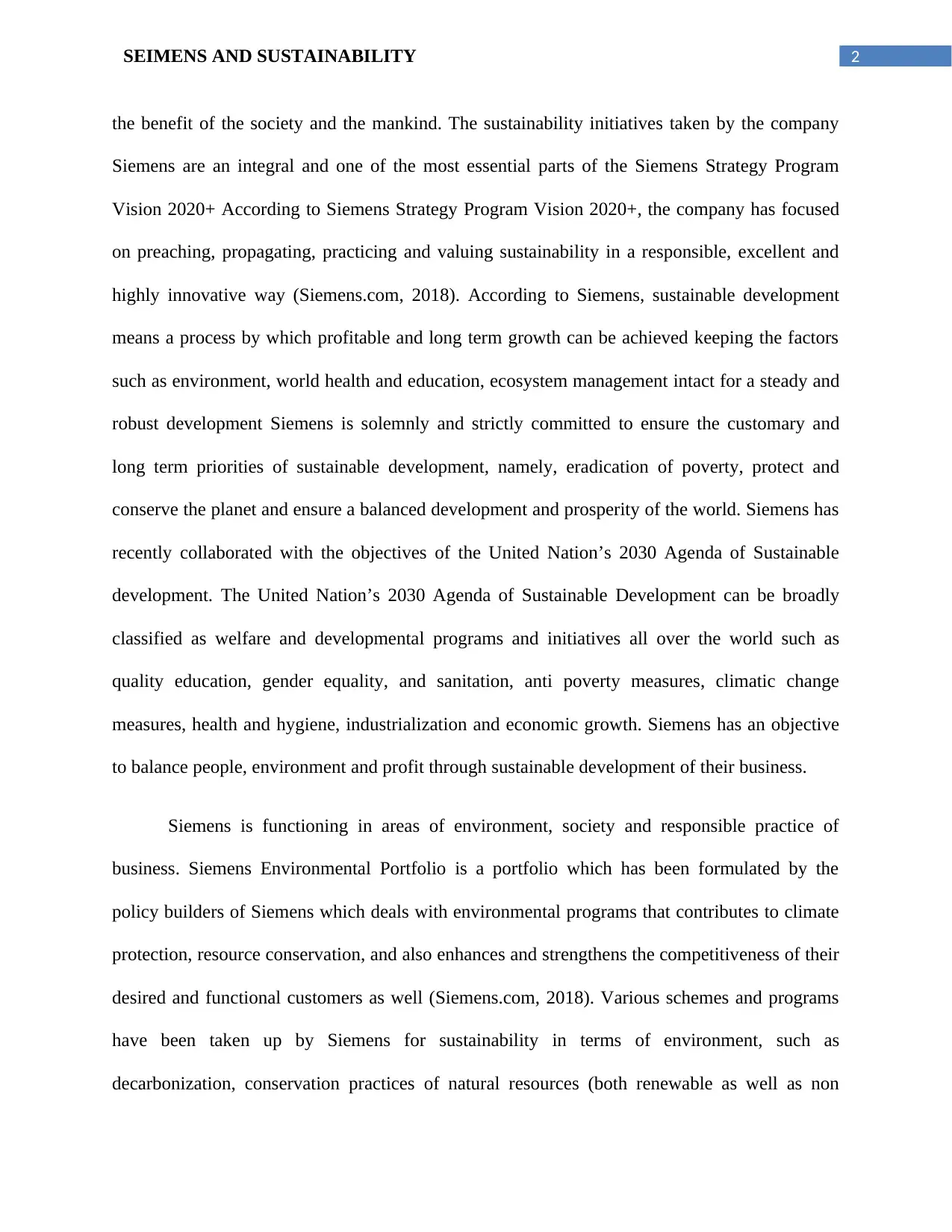
2SEIMENS AND SUSTAINABILITY
the benefit of the society and the mankind. The sustainability initiatives taken by the company
Siemens are an integral and one of the most essential parts of the Siemens Strategy Program
Vision 2020+ According to Siemens Strategy Program Vision 2020+, the company has focused
on preaching, propagating, practicing and valuing sustainability in a responsible, excellent and
highly innovative way (Siemens.com, 2018). According to Siemens, sustainable development
means a process by which profitable and long term growth can be achieved keeping the factors
such as environment, world health and education, ecosystem management intact for a steady and
robust development Siemens is solemnly and strictly committed to ensure the customary and
long term priorities of sustainable development, namely, eradication of poverty, protect and
conserve the planet and ensure a balanced development and prosperity of the world. Siemens has
recently collaborated with the objectives of the United Nation’s 2030 Agenda of Sustainable
development. The United Nation’s 2030 Agenda of Sustainable Development can be broadly
classified as welfare and developmental programs and initiatives all over the world such as
quality education, gender equality, and sanitation, anti poverty measures, climatic change
measures, health and hygiene, industrialization and economic growth. Siemens has an objective
to balance people, environment and profit through sustainable development of their business.
Siemens is functioning in areas of environment, society and responsible practice of
business. Siemens Environmental Portfolio is a portfolio which has been formulated by the
policy builders of Siemens which deals with environmental programs that contributes to climate
protection, resource conservation, and also enhances and strengthens the competitiveness of their
desired and functional customers as well (Siemens.com, 2018). Various schemes and programs
have been taken up by Siemens for sustainability in terms of environment, such as
decarbonization, conservation practices of natural resources (both renewable as well as non
the benefit of the society and the mankind. The sustainability initiatives taken by the company
Siemens are an integral and one of the most essential parts of the Siemens Strategy Program
Vision 2020+ According to Siemens Strategy Program Vision 2020+, the company has focused
on preaching, propagating, practicing and valuing sustainability in a responsible, excellent and
highly innovative way (Siemens.com, 2018). According to Siemens, sustainable development
means a process by which profitable and long term growth can be achieved keeping the factors
such as environment, world health and education, ecosystem management intact for a steady and
robust development Siemens is solemnly and strictly committed to ensure the customary and
long term priorities of sustainable development, namely, eradication of poverty, protect and
conserve the planet and ensure a balanced development and prosperity of the world. Siemens has
recently collaborated with the objectives of the United Nation’s 2030 Agenda of Sustainable
development. The United Nation’s 2030 Agenda of Sustainable Development can be broadly
classified as welfare and developmental programs and initiatives all over the world such as
quality education, gender equality, and sanitation, anti poverty measures, climatic change
measures, health and hygiene, industrialization and economic growth. Siemens has an objective
to balance people, environment and profit through sustainable development of their business.
Siemens is functioning in areas of environment, society and responsible practice of
business. Siemens Environmental Portfolio is a portfolio which has been formulated by the
policy builders of Siemens which deals with environmental programs that contributes to climate
protection, resource conservation, and also enhances and strengthens the competitiveness of their
desired and functional customers as well (Siemens.com, 2018). Various schemes and programs
have been taken up by Siemens for sustainability in terms of environment, such as
decarbonization, conservation practices of natural resources (both renewable as well as non
⊘ This is a preview!⊘
Do you want full access?
Subscribe today to unlock all pages.

Trusted by 1+ million students worldwide
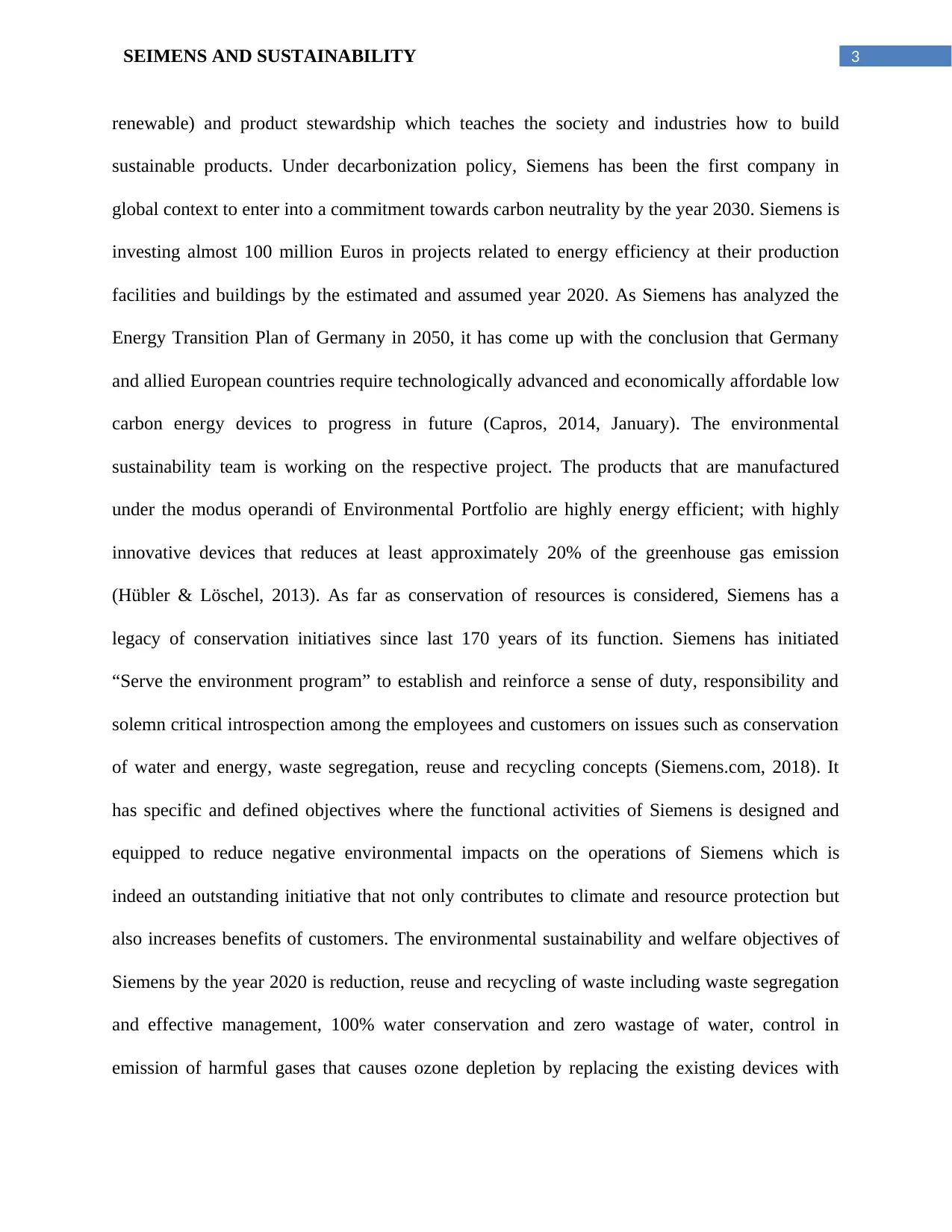
3SEIMENS AND SUSTAINABILITY
renewable) and product stewardship which teaches the society and industries how to build
sustainable products. Under decarbonization policy, Siemens has been the first company in
global context to enter into a commitment towards carbon neutrality by the year 2030. Siemens is
investing almost 100 million Euros in projects related to energy efficiency at their production
facilities and buildings by the estimated and assumed year 2020. As Siemens has analyzed the
Energy Transition Plan of Germany in 2050, it has come up with the conclusion that Germany
and allied European countries require technologically advanced and economically affordable low
carbon energy devices to progress in future (Capros, 2014, January). The environmental
sustainability team is working on the respective project. The products that are manufactured
under the modus operandi of Environmental Portfolio are highly energy efficient; with highly
innovative devices that reduces at least approximately 20% of the greenhouse gas emission
(Hübler & Löschel, 2013). As far as conservation of resources is considered, Siemens has a
legacy of conservation initiatives since last 170 years of its function. Siemens has initiated
“Serve the environment program” to establish and reinforce a sense of duty, responsibility and
solemn critical introspection among the employees and customers on issues such as conservation
of water and energy, waste segregation, reuse and recycling concepts (Siemens.com, 2018). It
has specific and defined objectives where the functional activities of Siemens is designed and
equipped to reduce negative environmental impacts on the operations of Siemens which is
indeed an outstanding initiative that not only contributes to climate and resource protection but
also increases benefits of customers. The environmental sustainability and welfare objectives of
Siemens by the year 2020 is reduction, reuse and recycling of waste including waste segregation
and effective management, 100% water conservation and zero wastage of water, control in
emission of harmful gases that causes ozone depletion by replacing the existing devices with
renewable) and product stewardship which teaches the society and industries how to build
sustainable products. Under decarbonization policy, Siemens has been the first company in
global context to enter into a commitment towards carbon neutrality by the year 2030. Siemens is
investing almost 100 million Euros in projects related to energy efficiency at their production
facilities and buildings by the estimated and assumed year 2020. As Siemens has analyzed the
Energy Transition Plan of Germany in 2050, it has come up with the conclusion that Germany
and allied European countries require technologically advanced and economically affordable low
carbon energy devices to progress in future (Capros, 2014, January). The environmental
sustainability team is working on the respective project. The products that are manufactured
under the modus operandi of Environmental Portfolio are highly energy efficient; with highly
innovative devices that reduces at least approximately 20% of the greenhouse gas emission
(Hübler & Löschel, 2013). As far as conservation of resources is considered, Siemens has a
legacy of conservation initiatives since last 170 years of its function. Siemens has initiated
“Serve the environment program” to establish and reinforce a sense of duty, responsibility and
solemn critical introspection among the employees and customers on issues such as conservation
of water and energy, waste segregation, reuse and recycling concepts (Siemens.com, 2018). It
has specific and defined objectives where the functional activities of Siemens is designed and
equipped to reduce negative environmental impacts on the operations of Siemens which is
indeed an outstanding initiative that not only contributes to climate and resource protection but
also increases benefits of customers. The environmental sustainability and welfare objectives of
Siemens by the year 2020 is reduction, reuse and recycling of waste including waste segregation
and effective management, 100% water conservation and zero wastage of water, control in
emission of harmful gases that causes ozone depletion by replacing the existing devices with
Paraphrase This Document
Need a fresh take? Get an instant paraphrase of this document with our AI Paraphraser
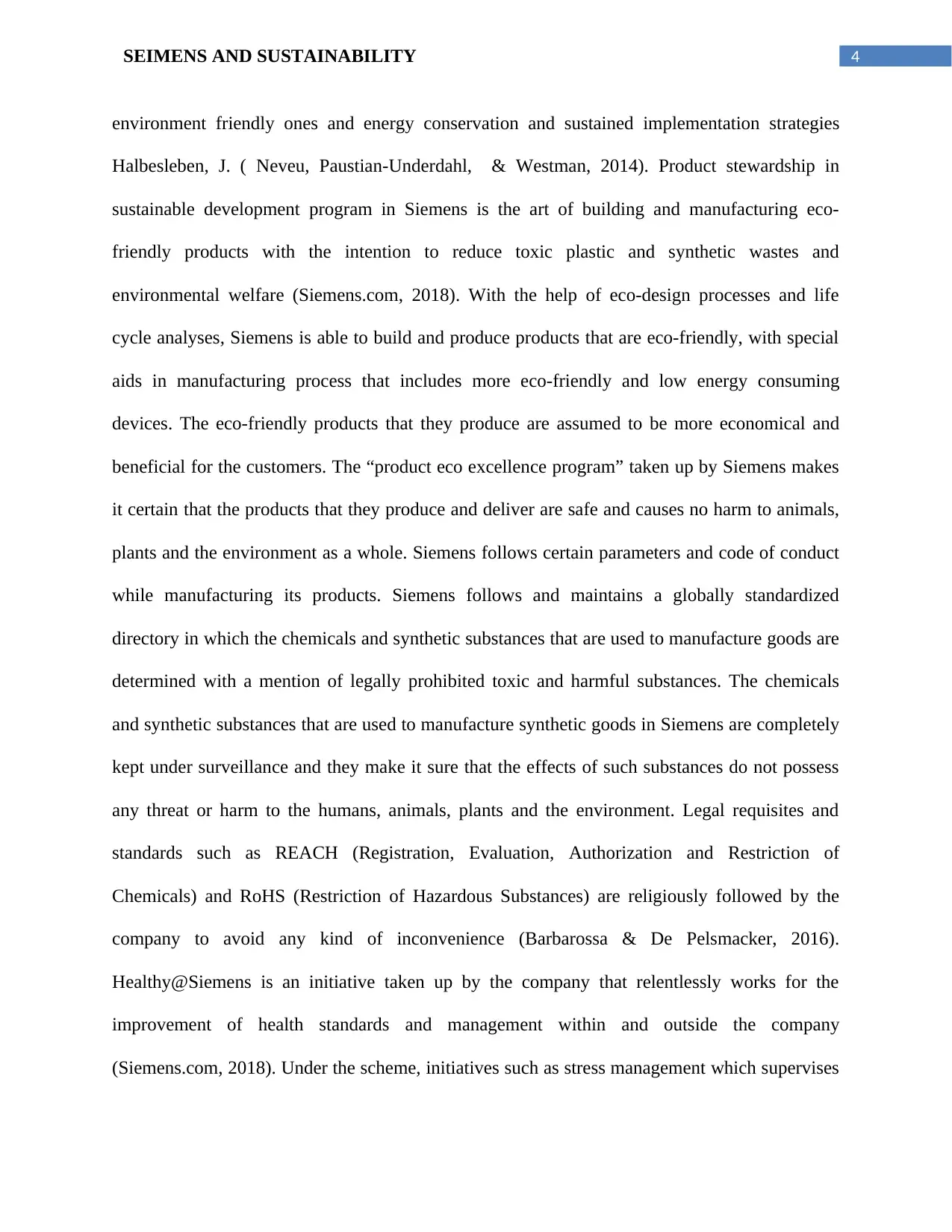
4SEIMENS AND SUSTAINABILITY
environment friendly ones and energy conservation and sustained implementation strategies
Halbesleben, J. ( Neveu, Paustian-Underdahl, & Westman, 2014). Product stewardship in
sustainable development program in Siemens is the art of building and manufacturing eco-
friendly products with the intention to reduce toxic plastic and synthetic wastes and
environmental welfare (Siemens.com, 2018). With the help of eco-design processes and life
cycle analyses, Siemens is able to build and produce products that are eco-friendly, with special
aids in manufacturing process that includes more eco-friendly and low energy consuming
devices. The eco-friendly products that they produce are assumed to be more economical and
beneficial for the customers. The “product eco excellence program” taken up by Siemens makes
it certain that the products that they produce and deliver are safe and causes no harm to animals,
plants and the environment as a whole. Siemens follows certain parameters and code of conduct
while manufacturing its products. Siemens follows and maintains a globally standardized
directory in which the chemicals and synthetic substances that are used to manufacture goods are
determined with a mention of legally prohibited toxic and harmful substances. The chemicals
and synthetic substances that are used to manufacture synthetic goods in Siemens are completely
kept under surveillance and they make it sure that the effects of such substances do not possess
any threat or harm to the humans, animals, plants and the environment. Legal requisites and
standards such as REACH (Registration, Evaluation, Authorization and Restriction of
Chemicals) and RoHS (Restriction of Hazardous Substances) are religiously followed by the
company to avoid any kind of inconvenience (Barbarossa & De Pelsmacker, 2016).
Healthy@Siemens is an initiative taken up by the company that relentlessly works for the
improvement of health standards and management within and outside the company
(Siemens.com, 2018). Under the scheme, initiatives such as stress management which supervises
environment friendly ones and energy conservation and sustained implementation strategies
Halbesleben, J. ( Neveu, Paustian-Underdahl, & Westman, 2014). Product stewardship in
sustainable development program in Siemens is the art of building and manufacturing eco-
friendly products with the intention to reduce toxic plastic and synthetic wastes and
environmental welfare (Siemens.com, 2018). With the help of eco-design processes and life
cycle analyses, Siemens is able to build and produce products that are eco-friendly, with special
aids in manufacturing process that includes more eco-friendly and low energy consuming
devices. The eco-friendly products that they produce are assumed to be more economical and
beneficial for the customers. The “product eco excellence program” taken up by Siemens makes
it certain that the products that they produce and deliver are safe and causes no harm to animals,
plants and the environment as a whole. Siemens follows certain parameters and code of conduct
while manufacturing its products. Siemens follows and maintains a globally standardized
directory in which the chemicals and synthetic substances that are used to manufacture goods are
determined with a mention of legally prohibited toxic and harmful substances. The chemicals
and synthetic substances that are used to manufacture synthetic goods in Siemens are completely
kept under surveillance and they make it sure that the effects of such substances do not possess
any threat or harm to the humans, animals, plants and the environment. Legal requisites and
standards such as REACH (Registration, Evaluation, Authorization and Restriction of
Chemicals) and RoHS (Restriction of Hazardous Substances) are religiously followed by the
company to avoid any kind of inconvenience (Barbarossa & De Pelsmacker, 2016).
Healthy@Siemens is an initiative taken up by the company that relentlessly works for the
improvement of health standards and management within and outside the company
(Siemens.com, 2018). Under the scheme, initiatives such as stress management which supervises
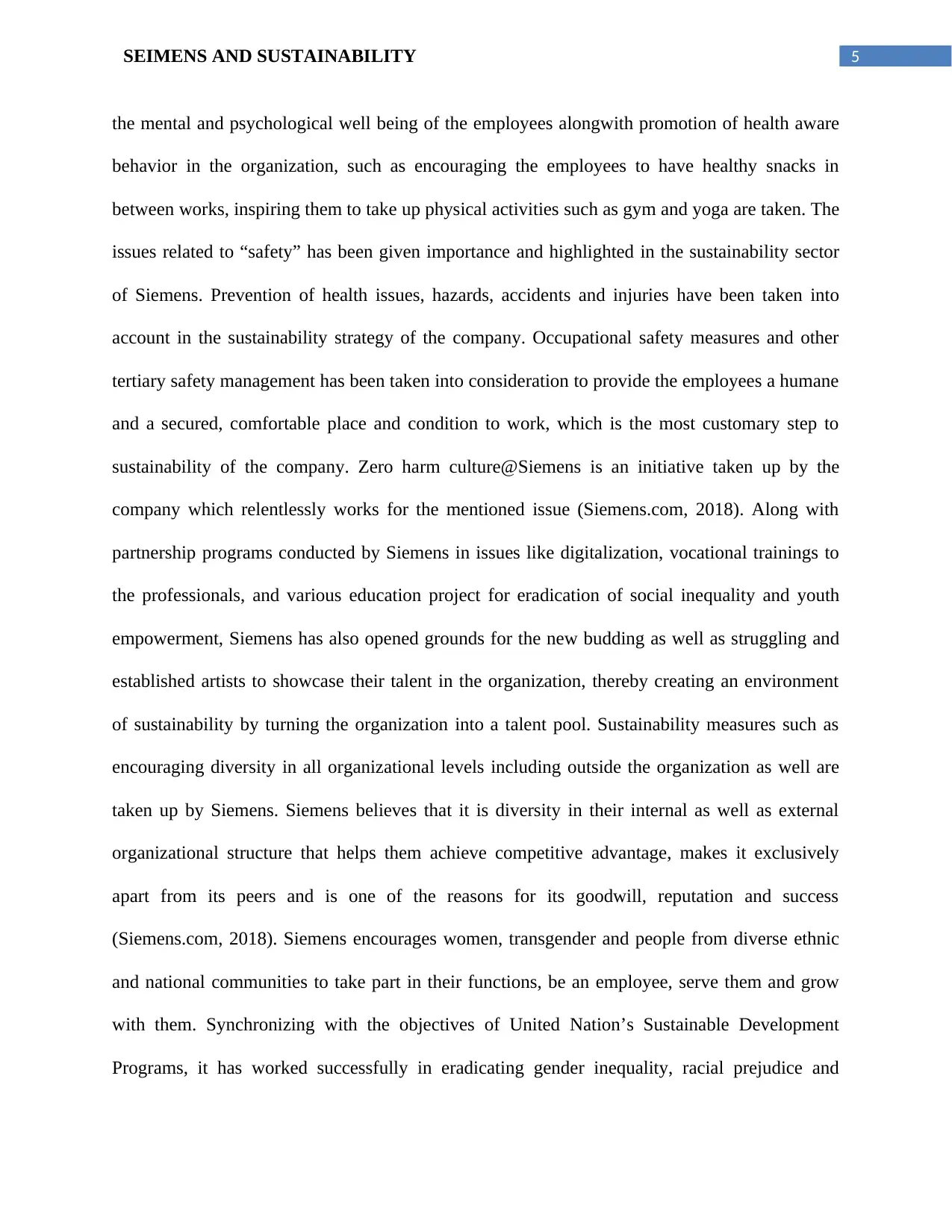
5SEIMENS AND SUSTAINABILITY
the mental and psychological well being of the employees alongwith promotion of health aware
behavior in the organization, such as encouraging the employees to have healthy snacks in
between works, inspiring them to take up physical activities such as gym and yoga are taken. The
issues related to “safety” has been given importance and highlighted in the sustainability sector
of Siemens. Prevention of health issues, hazards, accidents and injuries have been taken into
account in the sustainability strategy of the company. Occupational safety measures and other
tertiary safety management has been taken into consideration to provide the employees a humane
and a secured, comfortable place and condition to work, which is the most customary step to
sustainability of the company. Zero harm culture@Siemens is an initiative taken up by the
company which relentlessly works for the mentioned issue (Siemens.com, 2018). Along with
partnership programs conducted by Siemens in issues like digitalization, vocational trainings to
the professionals, and various education project for eradication of social inequality and youth
empowerment, Siemens has also opened grounds for the new budding as well as struggling and
established artists to showcase their talent in the organization, thereby creating an environment
of sustainability by turning the organization into a talent pool. Sustainability measures such as
encouraging diversity in all organizational levels including outside the organization as well are
taken up by Siemens. Siemens believes that it is diversity in their internal as well as external
organizational structure that helps them achieve competitive advantage, makes it exclusively
apart from its peers and is one of the reasons for its goodwill, reputation and success
(Siemens.com, 2018). Siemens encourages women, transgender and people from diverse ethnic
and national communities to take part in their functions, be an employee, serve them and grow
with them. Synchronizing with the objectives of United Nation’s Sustainable Development
Programs, it has worked successfully in eradicating gender inequality, racial prejudice and
the mental and psychological well being of the employees alongwith promotion of health aware
behavior in the organization, such as encouraging the employees to have healthy snacks in
between works, inspiring them to take up physical activities such as gym and yoga are taken. The
issues related to “safety” has been given importance and highlighted in the sustainability sector
of Siemens. Prevention of health issues, hazards, accidents and injuries have been taken into
account in the sustainability strategy of the company. Occupational safety measures and other
tertiary safety management has been taken into consideration to provide the employees a humane
and a secured, comfortable place and condition to work, which is the most customary step to
sustainability of the company. Zero harm culture@Siemens is an initiative taken up by the
company which relentlessly works for the mentioned issue (Siemens.com, 2018). Along with
partnership programs conducted by Siemens in issues like digitalization, vocational trainings to
the professionals, and various education project for eradication of social inequality and youth
empowerment, Siemens has also opened grounds for the new budding as well as struggling and
established artists to showcase their talent in the organization, thereby creating an environment
of sustainability by turning the organization into a talent pool. Sustainability measures such as
encouraging diversity in all organizational levels including outside the organization as well are
taken up by Siemens. Siemens believes that it is diversity in their internal as well as external
organizational structure that helps them achieve competitive advantage, makes it exclusively
apart from its peers and is one of the reasons for its goodwill, reputation and success
(Siemens.com, 2018). Siemens encourages women, transgender and people from diverse ethnic
and national communities to take part in their functions, be an employee, serve them and grow
with them. Synchronizing with the objectives of United Nation’s Sustainable Development
Programs, it has worked successfully in eradicating gender inequality, racial prejudice and
⊘ This is a preview!⊘
Do you want full access?
Subscribe today to unlock all pages.

Trusted by 1+ million students worldwide
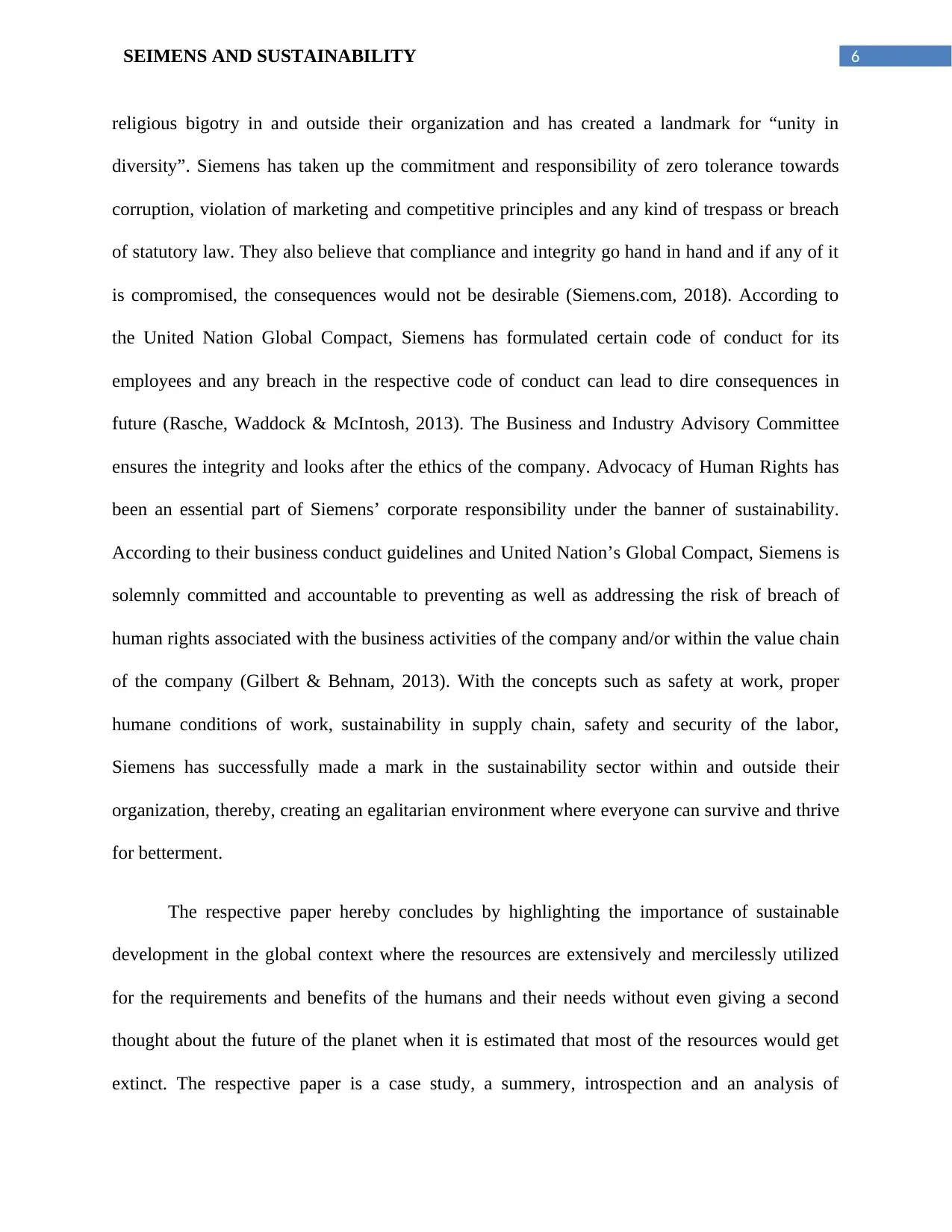
6SEIMENS AND SUSTAINABILITY
religious bigotry in and outside their organization and has created a landmark for “unity in
diversity”. Siemens has taken up the commitment and responsibility of zero tolerance towards
corruption, violation of marketing and competitive principles and any kind of trespass or breach
of statutory law. They also believe that compliance and integrity go hand in hand and if any of it
is compromised, the consequences would not be desirable (Siemens.com, 2018). According to
the United Nation Global Compact, Siemens has formulated certain code of conduct for its
employees and any breach in the respective code of conduct can lead to dire consequences in
future (Rasche, Waddock & McIntosh, 2013). The Business and Industry Advisory Committee
ensures the integrity and looks after the ethics of the company. Advocacy of Human Rights has
been an essential part of Siemens’ corporate responsibility under the banner of sustainability.
According to their business conduct guidelines and United Nation’s Global Compact, Siemens is
solemnly committed and accountable to preventing as well as addressing the risk of breach of
human rights associated with the business activities of the company and/or within the value chain
of the company (Gilbert & Behnam, 2013). With the concepts such as safety at work, proper
humane conditions of work, sustainability in supply chain, safety and security of the labor,
Siemens has successfully made a mark in the sustainability sector within and outside their
organization, thereby, creating an egalitarian environment where everyone can survive and thrive
for betterment.
The respective paper hereby concludes by highlighting the importance of sustainable
development in the global context where the resources are extensively and mercilessly utilized
for the requirements and benefits of the humans and their needs without even giving a second
thought about the future of the planet when it is estimated that most of the resources would get
extinct. The respective paper is a case study, a summery, introspection and an analysis of
religious bigotry in and outside their organization and has created a landmark for “unity in
diversity”. Siemens has taken up the commitment and responsibility of zero tolerance towards
corruption, violation of marketing and competitive principles and any kind of trespass or breach
of statutory law. They also believe that compliance and integrity go hand in hand and if any of it
is compromised, the consequences would not be desirable (Siemens.com, 2018). According to
the United Nation Global Compact, Siemens has formulated certain code of conduct for its
employees and any breach in the respective code of conduct can lead to dire consequences in
future (Rasche, Waddock & McIntosh, 2013). The Business and Industry Advisory Committee
ensures the integrity and looks after the ethics of the company. Advocacy of Human Rights has
been an essential part of Siemens’ corporate responsibility under the banner of sustainability.
According to their business conduct guidelines and United Nation’s Global Compact, Siemens is
solemnly committed and accountable to preventing as well as addressing the risk of breach of
human rights associated with the business activities of the company and/or within the value chain
of the company (Gilbert & Behnam, 2013). With the concepts such as safety at work, proper
humane conditions of work, sustainability in supply chain, safety and security of the labor,
Siemens has successfully made a mark in the sustainability sector within and outside their
organization, thereby, creating an egalitarian environment where everyone can survive and thrive
for betterment.
The respective paper hereby concludes by highlighting the importance of sustainable
development in the global context where the resources are extensively and mercilessly utilized
for the requirements and benefits of the humans and their needs without even giving a second
thought about the future of the planet when it is estimated that most of the resources would get
extinct. The respective paper is a case study, a summery, introspection and an analysis of
Paraphrase This Document
Need a fresh take? Get an instant paraphrase of this document with our AI Paraphraser
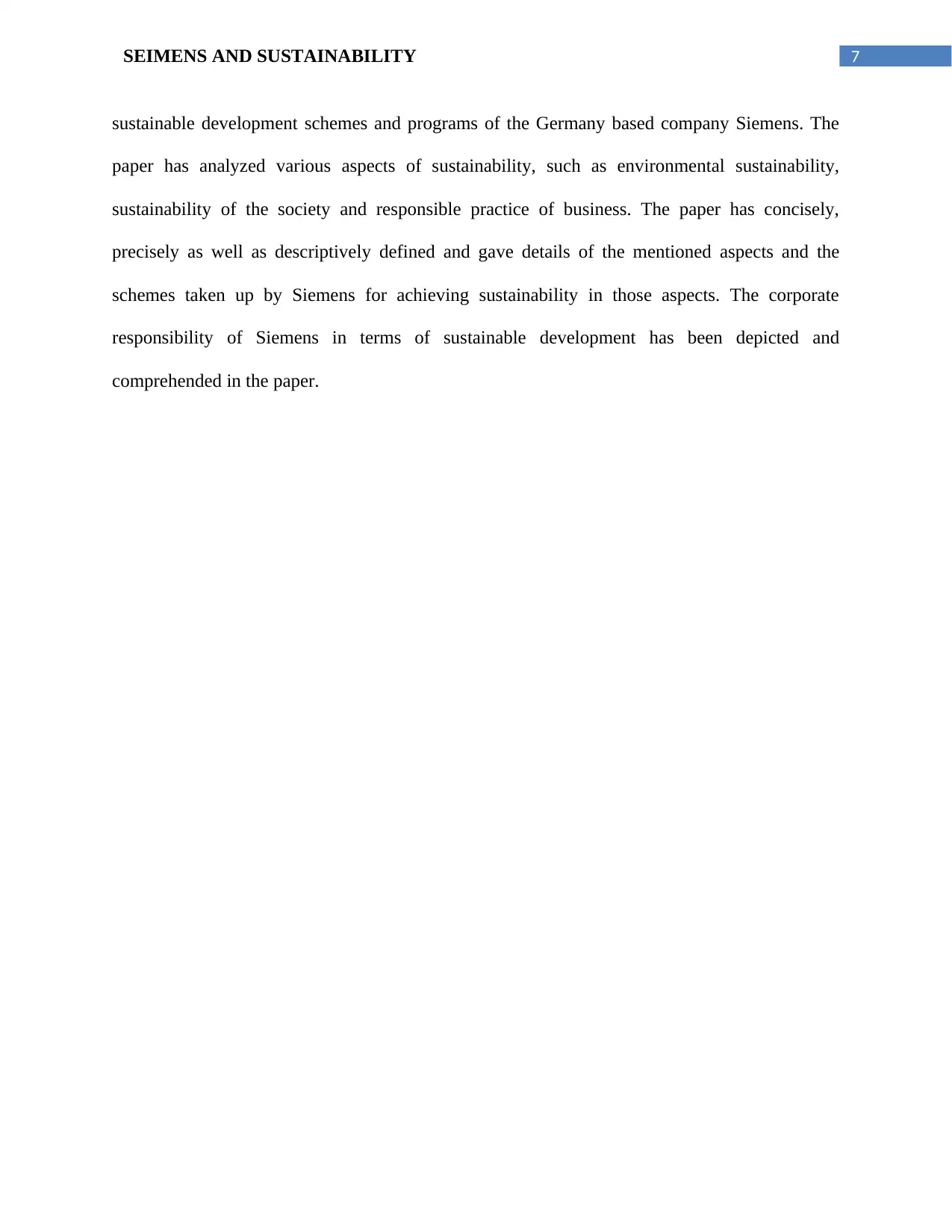
7SEIMENS AND SUSTAINABILITY
sustainable development schemes and programs of the Germany based company Siemens. The
paper has analyzed various aspects of sustainability, such as environmental sustainability,
sustainability of the society and responsible practice of business. The paper has concisely,
precisely as well as descriptively defined and gave details of the mentioned aspects and the
schemes taken up by Siemens for achieving sustainability in those aspects. The corporate
responsibility of Siemens in terms of sustainable development has been depicted and
comprehended in the paper.
sustainable development schemes and programs of the Germany based company Siemens. The
paper has analyzed various aspects of sustainability, such as environmental sustainability,
sustainability of the society and responsible practice of business. The paper has concisely,
precisely as well as descriptively defined and gave details of the mentioned aspects and the
schemes taken up by Siemens for achieving sustainability in those aspects. The corporate
responsibility of Siemens in terms of sustainable development has been depicted and
comprehended in the paper.
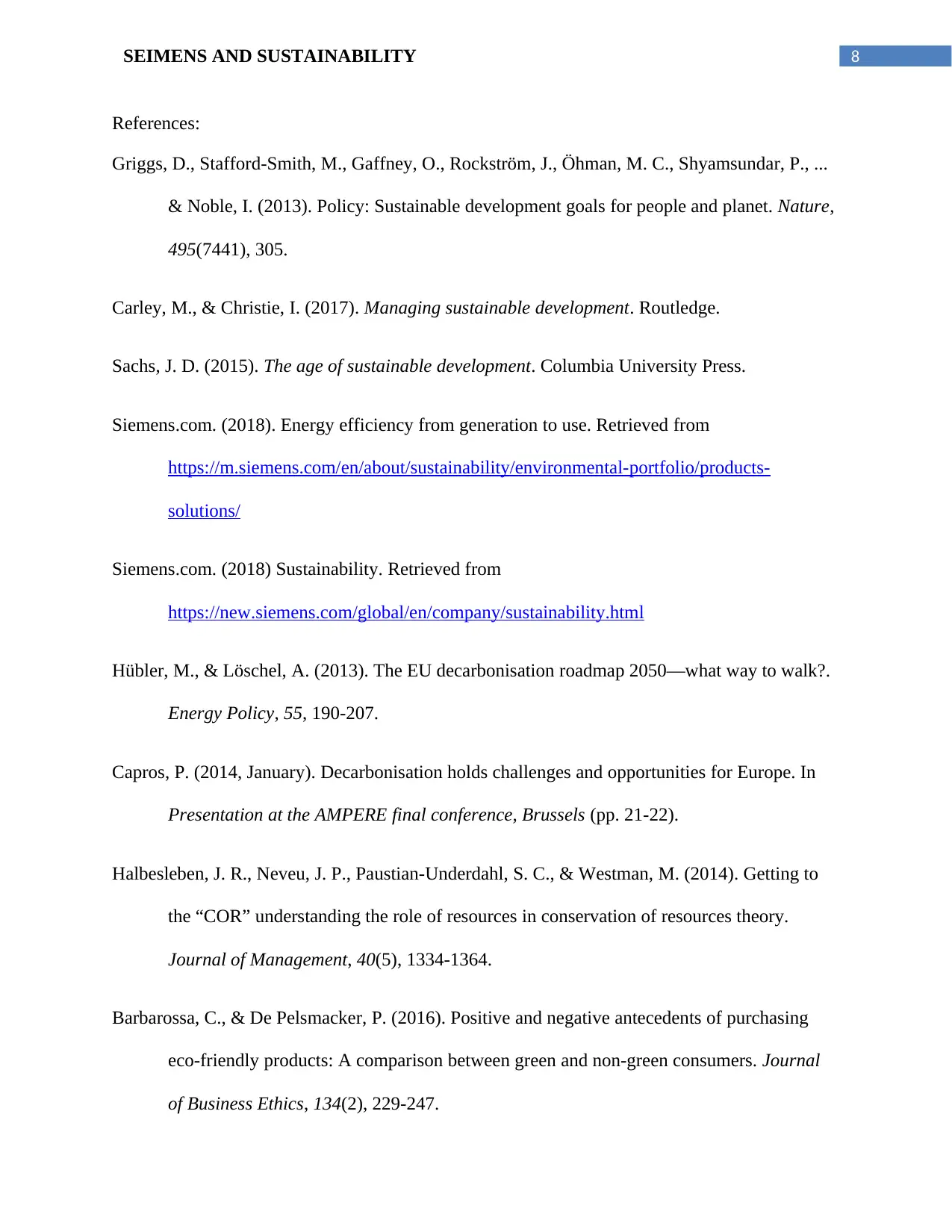
8SEIMENS AND SUSTAINABILITY
References:
Griggs, D., Stafford-Smith, M., Gaffney, O., Rockström, J., Öhman, M. C., Shyamsundar, P., ...
& Noble, I. (2013). Policy: Sustainable development goals for people and planet. Nature,
495(7441), 305.
Carley, M., & Christie, I. (2017). Managing sustainable development. Routledge.
Sachs, J. D. (2015). The age of sustainable development. Columbia University Press.
Siemens.com. (2018). Energy efficiency from generation to use. Retrieved from
https://m.siemens.com/en/about/sustainability/environmental-portfolio/products-
solutions/
Siemens.com. (2018) Sustainability. Retrieved from
https://new.siemens.com/global/en/company/sustainability.html
Hübler, M., & Löschel, A. (2013). The EU decarbonisation roadmap 2050—what way to walk?.
Energy Policy, 55, 190-207.
Capros, P. (2014, January). Decarbonisation holds challenges and opportunities for Europe. In
Presentation at the AMPERE final conference, Brussels (pp. 21-22).
Halbesleben, J. R., Neveu, J. P., Paustian-Underdahl, S. C., & Westman, M. (2014). Getting to
the “COR” understanding the role of resources in conservation of resources theory.
Journal of Management, 40(5), 1334-1364.
Barbarossa, C., & De Pelsmacker, P. (2016). Positive and negative antecedents of purchasing
eco-friendly products: A comparison between green and non-green consumers. Journal
of Business Ethics, 134(2), 229-247.
References:
Griggs, D., Stafford-Smith, M., Gaffney, O., Rockström, J., Öhman, M. C., Shyamsundar, P., ...
& Noble, I. (2013). Policy: Sustainable development goals for people and planet. Nature,
495(7441), 305.
Carley, M., & Christie, I. (2017). Managing sustainable development. Routledge.
Sachs, J. D. (2015). The age of sustainable development. Columbia University Press.
Siemens.com. (2018). Energy efficiency from generation to use. Retrieved from
https://m.siemens.com/en/about/sustainability/environmental-portfolio/products-
solutions/
Siemens.com. (2018) Sustainability. Retrieved from
https://new.siemens.com/global/en/company/sustainability.html
Hübler, M., & Löschel, A. (2013). The EU decarbonisation roadmap 2050—what way to walk?.
Energy Policy, 55, 190-207.
Capros, P. (2014, January). Decarbonisation holds challenges and opportunities for Europe. In
Presentation at the AMPERE final conference, Brussels (pp. 21-22).
Halbesleben, J. R., Neveu, J. P., Paustian-Underdahl, S. C., & Westman, M. (2014). Getting to
the “COR” understanding the role of resources in conservation of resources theory.
Journal of Management, 40(5), 1334-1364.
Barbarossa, C., & De Pelsmacker, P. (2016). Positive and negative antecedents of purchasing
eco-friendly products: A comparison between green and non-green consumers. Journal
of Business Ethics, 134(2), 229-247.
⊘ This is a preview!⊘
Do you want full access?
Subscribe today to unlock all pages.

Trusted by 1+ million students worldwide
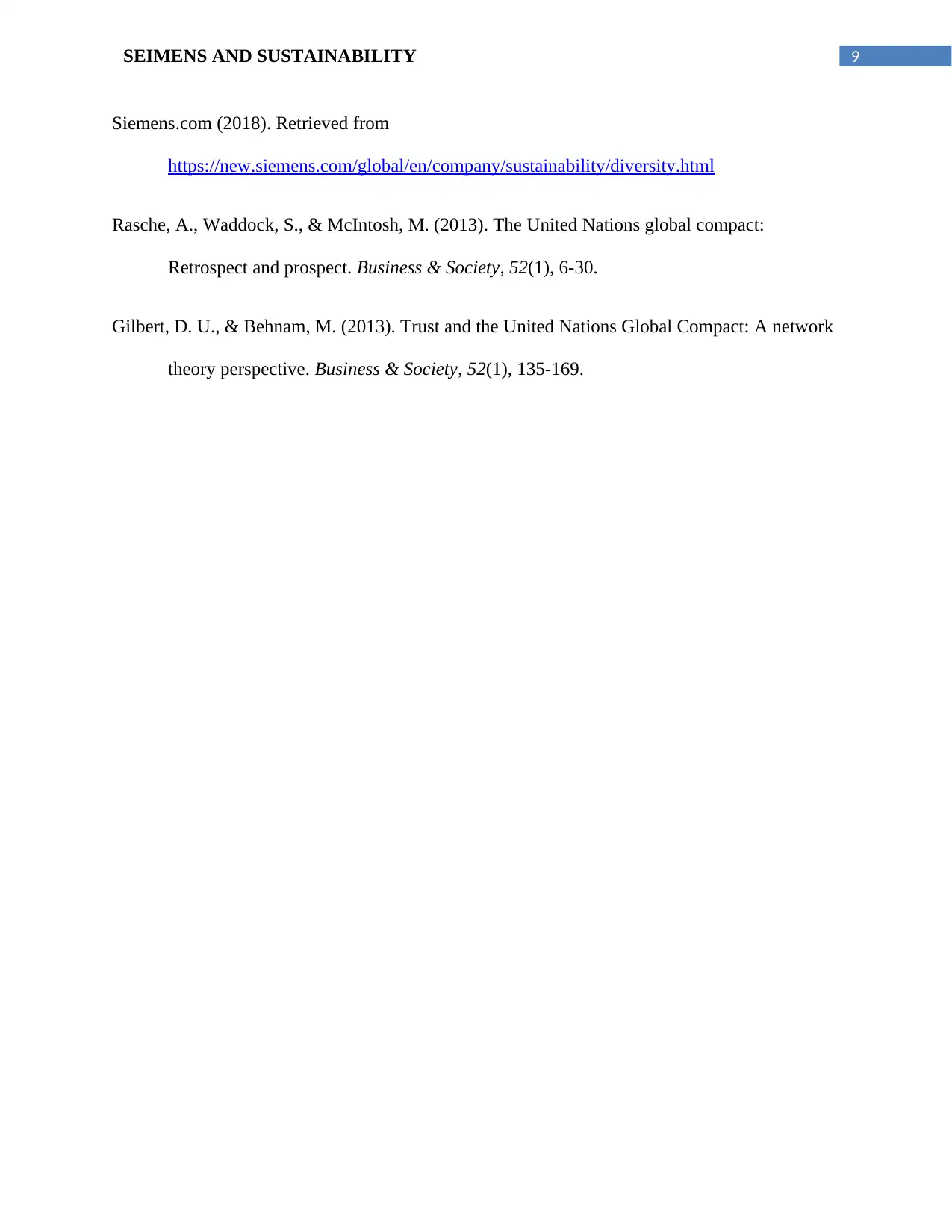
9SEIMENS AND SUSTAINABILITY
Siemens.com (2018). Retrieved from
https://new.siemens.com/global/en/company/sustainability/diversity.html
Rasche, A., Waddock, S., & McIntosh, M. (2013). The United Nations global compact:
Retrospect and prospect. Business & Society, 52(1), 6-30.
Gilbert, D. U., & Behnam, M. (2013). Trust and the United Nations Global Compact: A network
theory perspective. Business & Society, 52(1), 135-169.
Siemens.com (2018). Retrieved from
https://new.siemens.com/global/en/company/sustainability/diversity.html
Rasche, A., Waddock, S., & McIntosh, M. (2013). The United Nations global compact:
Retrospect and prospect. Business & Society, 52(1), 6-30.
Gilbert, D. U., & Behnam, M. (2013). Trust and the United Nations Global Compact: A network
theory perspective. Business & Society, 52(1), 135-169.
1 out of 10
Related Documents
Your All-in-One AI-Powered Toolkit for Academic Success.
+13062052269
info@desklib.com
Available 24*7 on WhatsApp / Email
![[object Object]](/_next/static/media/star-bottom.7253800d.svg)
Unlock your academic potential
Copyright © 2020–2026 A2Z Services. All Rights Reserved. Developed and managed by ZUCOL.
